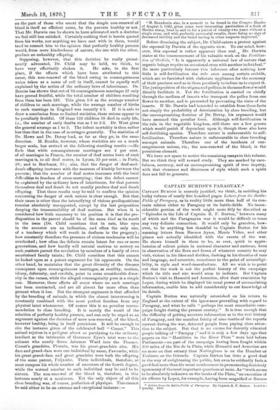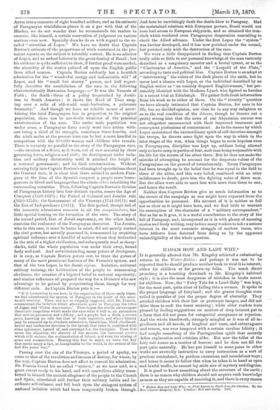CAPTAIN BURTON'S PARAGUAY.*
CAPTAIN BURTON is scarcely justified, we think, in entitling his bulky volume of nearly five hundred pages Letters from the Battle- Fields of Paraguay, as in reality little more than half of its con- tents relates either to Paraguay or its battle-fields. No incon- siderable portion of the work might more fitly be described as
Episodes in the Life of Captain R. F. Burton," between many of which and the Paraguayan war it would be difficult to trace any very definite connection. It would only be graceless, how- ever, to be anything but thankful to Captain Burton for his amusing letters from Buenos Ayres, Monte Video, and other places not actually identified with the events of the war. He shows himself in them to be, as ever, quick in appre- hension of salient points in national character and customs, keen in observation of the flora and fauna of whatever country he may visit, violent in his likes and dislikes, dashing in his theories of race and language, and eccentric, sometimes to the point of unintelligi- bility, in style and word-manufacture. All we wish is to point out that the work is not the perfect history of the campaign which its title and size would seem to indicate. But Captain Burton's visit to Humaita and Asuncion, after their evacuation by Lopez, during which he displayed his usual power of accumulating information, enable him to add considerably to our knowledge of its details.
Captain Burton was naturally astonished on his return to England at the extent of the ignorance prevailing with regard to. Paraguay, and what he calls "perhaps the most remarkable cam- paign fought during the present century." It is true enough that the difficulty of getting accurate information as to the real history of Paraguay, and the manifest falsity of nine-tenths of the reports current during the war, detei red people from paying close atten- tion to the subject. But that is no excuse for decently educated people talking of " Pariigay ;" and it is only a few days ago that papers on the "Hostilities in the River Plate" were laid before Parliament—no part of the campaign having been fought within 300 miles of the Rio de la Plata, while Humaiti and Asuncion are no more on that estuary than Nottingham is on the Humber or Toulouse on the Gironde. Captain Burton has done a good deal in the way of enlightening the public, but even he evidently feels a good deal more than his usual cautiousness in pronouncingdecisively upon many of the most important questions at issue. As "truth seems to be absolutely unknown on the banks of the Plate," an execution of six officers by Lopez, for example, having been magnified at Buenos Letters from the Battle-Fields of Paraguay. By Captain B. F. Burton. London : Tinsley. 1869.
Ayres into a massacre of eight hundred soldiers, and as his estimate of Paraguayan truthfulness places it on a par with that of the Hindoo, we do not wonder that he recommends his readers to exercise, like himself, a certain reservation of judgment on various matters even now. Specially does he do so with regard to the so- called "atrocities of Lopez." We have no doubt that Captain Burton's estimate of the proportions of truth contained in the pre- valent reports on the subject is tolerably correct. He is no admirer of Lopez, and an ardent believer in the great destiny of Brazil ; but his evidence is quite sufficient to show, if further proof were needed, the absurdity of the stories palmed off upon the English public from allied sources. Captain Burton evidently has a heartfelt admiration for the " wonderful energy and indomitable will" of Lopez, and his "small but sinewy" power, and half regret- fully describes the annihilation of the race in the following 'characteristically Burtonian language :—" It was the Nemesis of Faith ; the death - throe of a policy bequeathed by Jesuit- ism to South America ; it shows the flood of Time surg- ing over a relic of old-world semi-barbarism, a palmozoic humanity." And though we have no reliable means of ascer- taining the total Paraguayau loss in proportion to the original population, there can be no- doubt whatever of the practical 'extermination of the race. The entire male population was under arms, a Paraguayan force rarely went into action with- o ut losing a third of its strength, sometimes three-fourths, and the adult males at the present time can be but a mere handful in - comparison with the 200,000 women and children who remain. There is certainly no parallel to the story of the Paraguayan race, —the creation of a State, as it were, out of rag material by sheer governing force, religious and civil ; its development under isola-
tion and military dictatorship until it attained the height of -a national government; and its final extermination. Without entering fully into Captain Burton's ethnological speculations about the Guarani race, it is clear that there existed in modern Para- guay at the time of the Spanish conquest a people more homo- geneous in blood and language than the ethnic debris inhabiting the surrounding countries. Then, following Captain Burton's division of Paraguayan history into four distinct epochs, comes the Age of Conquest (1528-1620) ; the Period of Colonial and Jesuitic rule (1620-1754) ; the Government of the Viceroys (1724-1811) ; and the Era of Independence (1811). The first period, though full of the romantic adventures common to all the conquistadores, has
little special bearing on the formation of the race. The story of the second period, that of Jesuit supremacy, on the other hand, -contains the real secret of the Paraguayan character. The Jesuits, who in this case, it must be borne in mind, did not merely control the civil power, but actually possessed it, commenced by acquiring
.apiritual influence over a handful of natives whom they instructed in the arts of a higher civilization, and subsequently used as decoy- .ducks, until the whole population was under their sway, bound body and soul. And notwithstanding many points of divergence, it is easy, as Captain Burton points out, to trace the germs of many of the most prominent features of Dr. Francia's system, and that of the two Lopez, in the Jesuit rt'fiiine. Isolation, universal .military training, the habituation of the people to unreasoning obedience, the creation of a bigoted belief in national superiority, and similar influences all prepared the way for a Dictator who saw
advantage to be gained by perpetuating them, though for very -different ends. As Captain Burton puts it :—
"It is interesting to seo how, in the organization of those early times, we find adumbrated the system of Paraguay in the heart of the nine- teenth century. Then, and not as vulgarly supposed, with Dr. Francia, .commenced the isolation which afterwards gave to Paraguay the titles of Japan and Chino Anuirioaine.' Then began the sterile, extravagant theocratic despotism which made the race what it still is, an automaton that acts as peasantry and soldiery ; not a people, but a flock, a servum peens, knowing no rule but that of their superiors, and whose history may be summed up in absolute submission, fanaticism, blind obedience, heroic and barbarous devotion to the tyrant that rules it, combined with 'crass ignorance, hatred of, and contempt for, the foreigner. Then first arose the oligarchy, the slavery of the masses, the incessant corvees which still endure, the regimentation of labour, and even the storing of >arms and ammunition. Bearing this fact in mind, we have the key that opens many a fact, 80 inexplicable to the world, in tho events of the dast five years' war."
Passing over the era of the Viceroys, a period of apathy, we come to that of the revolution and its man of destiny, for whom, by the way, Captain Burton does not affect to conceal his admiration. Dr. Francia found his so-called "system," as we have said, to a great extent ready to his hand, and with marvellous ability trans- ferred to himself the ancient allegiance of the people to the Church and Spain, stimulated still further their military habits and in- ordinate self-reliance, and fell back upon the stringent syetem of national isolation which had been temporarily broken through. And here he unwittingly dealt the death-blow to Paraguay. Had she maintained relations with European powers, Brazil would not have had access to European shipyards, and so obtained the iron. dads which rendered even Paraguayan desperation unavailing to check the Allied advance. Under the first Lopez the "system" was further developed, and it has now perished under the second, but perished only with the destruction of the race.
We were a little disappointed in finding that Captain Burton really adds so little to our personal knowledge of the man variously described as a sanguinary monster and a brutal tyrant, or as the "Cincinnati's of America," and the "Leopold of the Plate," according to taste and political bias. Captain Burton is an adept at " interviewing " the rulers of the dark places of the earth, but he never had a chance with Lopez, or the individual described by an English writer as "an amiably disposed Englishwoman," but pre- sumably identical with the Madame Lynch who figured as heroine in a recent trial at Edinburgh. We gather little fresh information from his work as to either of them. On the " atrocity " question we have already intimated that Captain Burton, for once in his life, has no decided opinion, nor does he in any way enlighten us as to the real condition of the delenus, though he throws out a pretty strong hint that the news of our Abyssinian success was not altogether unconnected with their improved treatment and consequent professions of contentment. As to the means by which Lopez maintained the extraordinary spirit of self-devotion amongst his troops, he throws some light upon the way in which in the later stages of the war, when things began to seem hopeless even to Paraguayans, discipline was kept up, soldiers being allowed only to leave camp in parties of four, each man being responsible with his life for the return of the other three." But he does not make the mistake of attempting to account for the desperate valour of the Paraguayans on the ground of terrorism only. Every Paraguayan had been brought up in the belief that he was equal in the field to three of the allies, and this very belief, combined with an utter indifference to death, gave him the fighting value of three men. But the allies were able to meet him with more than three to one, and hence the result.
Neither does Captain Burton give as much information as to the events of the campaign as one might have expected from the opportunities he possessed. His account of it is neither so full nor so clear as it might have been, and we find little to warrant his assumption of the character of a "military correspondent." But as far as it goes, it is a useful contribution to the story of the fall of Paraguay, and, interspersed as it is with plenty of amusing stories and lively writing, may induce many readers to take a serious interest in the most romantic struggle of modern times, who have hitherto been deterred from doing so by the apparent unintelligibility of the whole question.









































 Previous page
Previous page